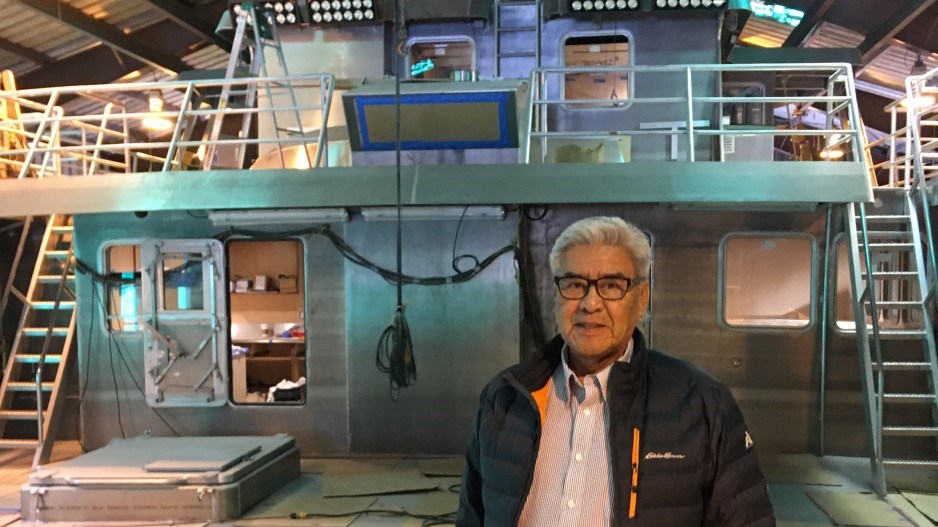When it comes to commercial fishing and salmon farming in B.C., the discussion is often framed as a zero-sum game.
The general perception is that First Nations and commercial fishermen view salmon farms as a threat to the wild salmon fishery and do not believe the two industries can coexist.
If that’s true, though, then James Walkus is a walking contradiction.
A First Nations businessman, Walkus is one of the top independent commercial fishermen on the B.C. coast. But he also runs a business, James Walkus Fishing Co., that serves the salmon farming industry.
His company, based in Port Hardy, owns a fleet of six commercial fishing boats, a small gillnet boat and one large transport boat – a $9 million vessel called Amarissa Joye that was built specifically for transporting fish from salmon farms in the region to the Marine Harvest Canada fish processing plant in Port Hardy.
He employs 30 people year-round, and up to 50 when there are commercial fishing openings for salmon and herring. About 80% of his employees are Aboriginal, most of them from his own First Nation in Port Hardy.
“He is one of the most successful business people, probably, on the North Island,” said Port Hardy Mayor Hank Bood.
Like all good businessmen, Walkus can anticipate trends and is willing to take risks – such as investing $20 million in specialized transport boats for salmon farms at a time when the industry is under the provincial government’s microscope.
“James is one of those people that can see the future,” Bood said. “He’s a guy that sees trends really well, and he was able to get in on the aquaculture sector really early on.”
Walkus is a member of the Gwa’sala-’Nakwaxda’xw, an amalgamation of two tribes that occupied the Smith and Seymour inlets before being combined and moved in 1964 to the Tsulquate reserve in Port Hardy. The 79-year-old businessman has been a commercial fisherman all his life, as was his father. Commercial fishing still represents nearly half of his business income. But commercial fishing is unpredictable, so expanding into the salmon farming service sector has provided the kind of stable revenue that allows him to provide steady employment for more than two dozen people.
“Salmon farming, there’s a little more in it because it’s a year-round operation,” Walkus said. “Forty or forty-five per cent of my business is still commercial fishing. It’s still a very viable business.”
In the late 1990s, Walkus was approached by Heritage Aquaculture, which was later acquired by Norway-based fish farming corporation Cermaq.
Heritage needed boats to get its fish to the processing plant, and since he was one of the biggest independent fishermen in the area, he was asked if he could spare any of his vessels in the wintertime, when he wasn’t fishing, to transport fish.
His fish farm service business has grown since then to meet the needs of the industry’s expansion in the area. Marine Harvest has 44 fish farm sites in the Broughton Archipelago, of which 32 to 38 are active at any given time.
In 2014, Walkus invested $9 million to have the Amarissa Joye built specifically to transport fish. He is investing another $11 million on a second transport vessel, which is being built at the ABD Aluminum Boats shipyard in North Vancouver.
When the new 105-feet-by-34-feet boat hits the water in mid-July, it will bring his company’s fleet of boats to eight – two for transport and six for commercial fishing, three of which can also be used for transporting farmed fish.
The new boat will be able to transport up to 450,000 pounds of farmed salmon per trip, and will be skippered by Walkus’ son, Lloyd.
“Marine Harvest is increasing its production by another 20% to 25%,” Walkus explained when asked why he was making such a large investment.
“Now they’re bringing in 400,000 pounds per day, and by the end of 2018, beginning of 2019, they want to be processing 600,000 pounds a day.”
That’s provided the BC NDP government doesn’t decide to cancel some of Marine Harvest’s fish farm licences and phase out open-net salmon farming, as Washington state is doing.
Walkus said it would be devastating for his business and other First Nations who rely on the fish farming industry for jobs and rental income.
“These two big boats, it will put them out of commission, unless I can sell them out of the country,” Walkus said.
Despite the pressure on the provincial government to phase out open-net salmon farms, Walkus doesn’t believe that will happen.
“I believe they’re business-minded enough to see that we need the operation,” Walkus said.
According to the BC Salmon Farmers Association, salmon farming provides 6,600 direct and indirect jobs, 20% of which are held by First Nations people.
But what about the concerns that salmon farms pose a risk to wild salmon?
As a commercial fisherman who has had a long working relationship with the salmon farming industry, Walkus has a unique perspective on both industries. He doesn’t think the two are incompatible.
“I’m still very deeply involved with commercial fishing, so I don’t want to see anything that would hinder our wild stock,” he said. “We monitor very closely their operation. I don’t believe that aquaculture is doing any harm to our industry.”




